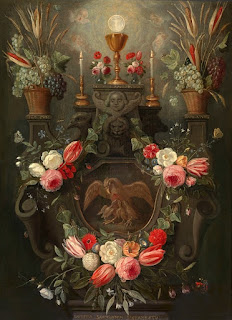O divine Manna and true Bread from Heaven! We believe and profess that enclosed beneath these accidents are all the savors and delights of the soul; but anima nostra nauseat super cibo isto, because nihil respiciunt oculi nostri, nisi man. This was the temptation anciently with which God tempted and tested the Israelite people in the manna: Ut tentem eum.
And this is today the temptation with which He tests the Catholic people in the Sacrament:Tentat vos Dominus Deus vester. The Hebrews, except for one Moses and the few who followed him; the Christians, except for another Moses and the few who follow Him, we see all overpowered by the temptation, because all delight more in the profane and abominable tables of Egypt than in the Bread of Heaven.
The reason for such a great irrationality in the former and in the latter is the same: In the Hebrews because they saw nothing more than manna; in the Christians because we see nothing more than these blank white accidents. Nihil respiciunt oculi nostri nisi man. O weakness of faith! O blindness and tyranny of the human eyes! God tempts us in these days, and the world tempts us, and the one and the other temptation put a trap for our eyes, but the one of God in closed eyes, the one of the world in open eyes. God tempts and tests us with His presence concealed; the world tempts us with its public manifestations.
And as these representations are seen, and that Presence cannot be seen, instead of the triumph of faith against the appetites and deceptions of the sight, the tyranny of the sight triumphs against the obligations of the Faith. If Christ as He stands present traversed that veil which encloses Him and suddenly appeared in this church as in the Transfiguration at Tabor, the whole city of Peter would say as did Peter himself: Bonum est nos hic esse.
But Christ does not wish to conquer the world by the same weapons. He puts Himself in camp against it, invisible to our eyes, because He comes to make a test of our faith and our love: Ut palam fiat, utrum diligatis eum, an non... Let no one think that he loves Christ who does not put His invisible presence ahead of everything that is seen and can be seen in the world.1
1 Vieira, S.J., Antônio, Sermon on the Most Blessed Sacrament (1674). (Translation by Fr. John Rickert.)
